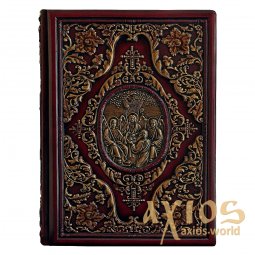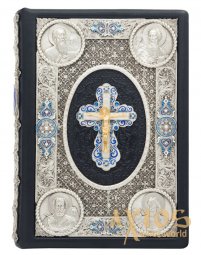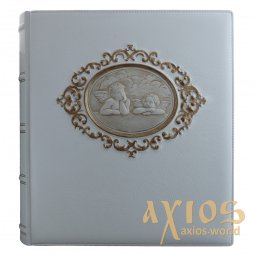Illustrations: color
Cover: Leather
Leather material
Paper Type: Offset
Color: Silver, Black
Size: 210x260 mm
Number of pages: 397
The book "Orthodox Saints of the World" will tell you about the famous saints, traditions and Orthodox foundations. Orthodoxy (from Greek means correct judgment, teaching or glorification) is a trend in Christian culture, which was fully formed during the 1st millennium from the Nativity of Christ in the east of the Roman Empire.
The term "Orthodoxy" appeared as an antonym to heterodoxia, which designated others, that is, non-church theological views of heretics or teachers, whose opinion was rejected by the church for some reason. In the Christian context, “Orthodoxy” is found even in the II century in the writings of the apologist Clement of Alexandria. The terminological meaning of the word is fixed only in Eusebius of Caesarea, and is officially recorded for the first time in the acts of the "Council of Chalcedon", and only since the time of Justinian is "Orthodoxy" used to designate theological views quite widely. In doctrinal documents, this term was sometimes used as a synonym for catholic. In this sense, it is also used by the Roman Catholic Church in liturgical texts, and for the ancient Eastern pre-Chalcedonian Orthodox churches is even part of their common name.
The book "Orthodox Saints of the World" will tell you about the famous saints, traditions and Orthodox foundations. Orthodoxy (from Greek means correct judgment, teaching or glorification) is a trend in Christian culture, which was fully formed during the 1st millennium from the Nativity of Christ in the east of the Roman Empire.
The term "Orthodoxy" appeared as an antonym to heterodoxia, which designated others, that is, non-church theological views of heretics or teachers, whose opinion was rejected by the church for some reason. In the Christian context, “Orthodoxy” is found even in the II century in the writings of the apologist Clement of Alexandria. The terminological meaning of the word is fixed only in Eusebius of Caesarea, and is officially recorded for the first time in the acts of the "Council of Chalcedon", and only since the time of Justinian is "Orthodoxy" used to designate theological views quite widely. In doctrinal documents, this term was sometimes used as a synonym for catholic. In this sense, it is also used by the Roman Catholic Church in liturgical texts, and for the ancient Eastern pre-Chalcedonian Orthodox churches is even part of their common name.












